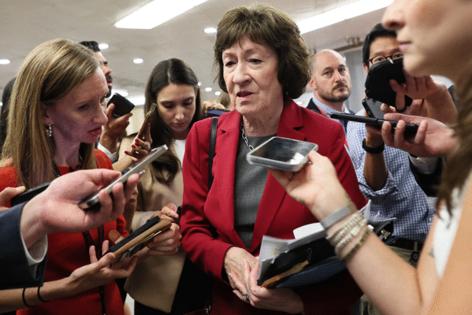Senate GOP pushes spending bills as Democratic anger builds
Published in Political News
WASHINGTON — Senate Republican appropriators want their leadership to bring an initial package of fiscal 2026 spending bills to the floor before August recess, Appropriations Chair Susan Collins, R-Maine, said Thursday.
The committee has reported four of its 12 annual bills: the Agriculture, Commerce-Justice-Science, Legislative Branch and Military Construction-VA measures. Senate Majority Leader John Thune, R-S.D., has not yet shared any timeframe, but a source familiar with his thinking said the GOP leader considers bringing bills to the floor before the August recess to be a priority.
“It’s going to be up to Sen. Thune, but I would love to see the first minibus brought to the Senate floor before we break for the August recess,” Collins said, referring to a potential bundle of several bills. “I don’t know what it would be, whether it would be two bills, three bills, or four bills.”
Collins said the Senate has received the House-passed Military Construction-VA bill, “so we don’t have the vehicle problem that we frequently have,” she said, since appropriations bills traditionally begin in the House.
Thune is evidently listening to Collins, because on Thursday afternoon he filed cloture on a motion to proceed to the House-passed Military Construction-VA bill. If the chamber can get the 60 votes needed to end debate and bring the measure to the floor, it could be amended with the text of not only the Senate version but other committee-reported draft bills as well.
But the already shaky bipartisan appropriations process has come under increasing strain in recent weeks. Democrats warned that passage of a $9 billion package to claw back previously approved foreign aid and public broadcasting funding would erode the trust needed to cut bipartisan deals, which are critical in the Senate.
Ranking member Patty Murray, D-Wash., said by supporting that bill, Republicans made passing bipartisan appropriations bills more difficult.
“There is no doubt in my mind the bills that we negotiate together will be far preferable to the partisan House bills that cut like there’s no tomorrow or another slush fund CR,” she said, referring to a continuing resolution that extends the previous year’s spending levels.
Democrats appear willing to play ball, at least for now. An Appropriations Committee markup proceeded as usual Thursday morning, just after the Senate passed the rescission bill on a mostly party-line vote of 51-48 hours earlier.
But White House budget director Russ Vought angered Democrats anew Thursday by saying at a Christian Science Monitor breakfast that the appropriations process should be “less bipartisan.”
Senate Minority Leader Charles E. Schumer, D-N.Y., quickly held an impromptu news conference to call for Vought to be fired.
“I’m just furious,” Schumer told reporters. “Donald Trump should fire Russell Vought immediately before he destroys our democracy and runs the country into the ground.”
Schumer said Vought has shown his contempt for Congress by freezing appropriated funds and by proposing to use “pocket rescissions” to cancel funding without congressional approval in the closing days of the fiscal year.
Collins and Sen. Lisa Murkowski, R-Alaska, echoed that criticism in softer tones.
“The best way for us to counter what has been said by the OMB director is to continue to work in a bipartisan way, and I hope we are going to do so,” Collins said.
But Vought made no apologies for his hard-line stance.
“There is no voter in the country that went to the polls and said, ‘I’m voting for a bipartisan appropriations process,’” he said. “The appropriations process has to be less bipartisan. We’re $37 trillion in debt, and we produce CRs every year. I actually think that over time, if we have a more partisan appropriations process for a time, it will lead to more bipartisanship.”
And aside from rising partisan political tensions, policy and funding disputes still threaten to bog down the process.
While the committee approved the Agriculture, Legislative Branch and Military Construction-VA bills with broad bipartisan support, the Commerce-Justice-Science bill proved more controversial. That measure was reported out on a 19-10 vote, with only four Democrats joining all the committee Republicans in support.
Many of the Democrats switched their votes to “no” after Republicans adopted an amendment to undo a previously adopted amendment, offered by subcommittee ranking member Chris Van Hollen, D-Md., that would require the new FBI headquarters to be built at a Maryland site that had been selected instead of in downtown Washington, as the Trump administration wants.
Murkowski, a key GOP centrist, originally voted for Van Hollen’s amendment last week but switched her vote after a meeting with FBI Director Kash Patel.
Passing that bill on the Senate floor, with the 60-vote threshold to cut off debate, may be more difficult than the others.
Commerce-Justice-Science Subcommittee Chairman Jerry Moran, R-Kan., said he expects his bill be included in the package that hits the Senate floor.
“It’s still bipartisan, in kind of a significant way, in today’s world,” he said.
(David Lerman and Paul M. Krawzak contributed to this report.)
©2025 CQ-Roll Call, Inc., All Rights Reserved. Visit cqrollcall.com. Distributed by Tribune Content Agency, LLC.

























































Comments